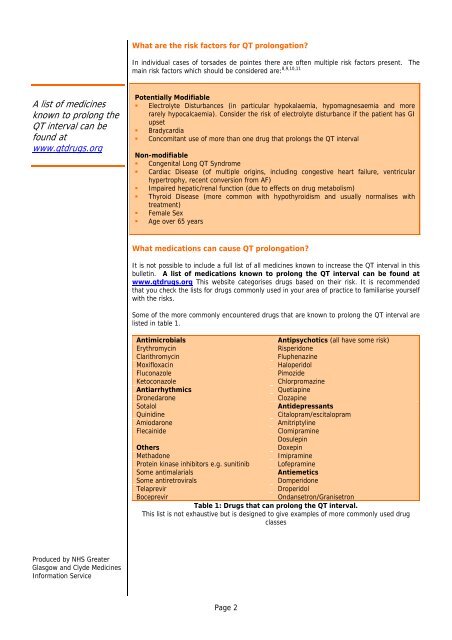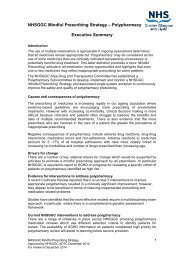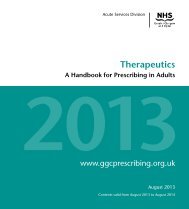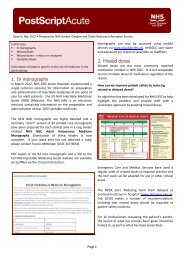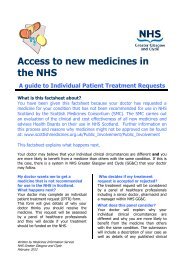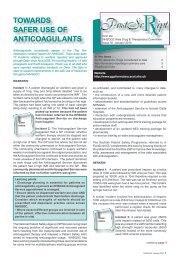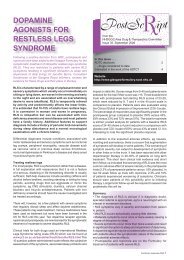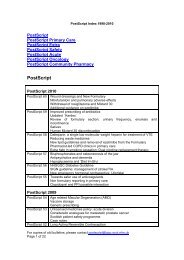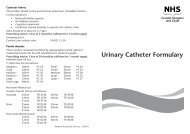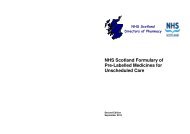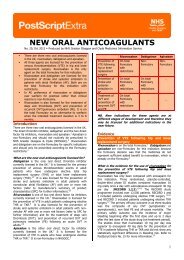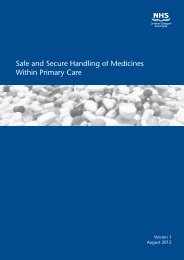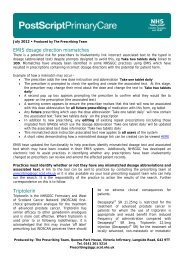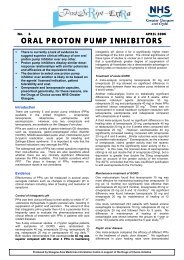What are the risk factors for <strong>QT</strong> prolongation?In individual cases of torsades de pointes there are often multiple risk factors present. Themain risk factors which should be considered are: 8,9,10,11A list of medicinesknown to prolong the<strong>QT</strong> interval can befound atwww.qtdrugs.orgPotentially Modifiable• Electrolyte Disturbances (in particular hypokalaemia, hypomagnesaemia and morerarely hypocalcaemia). Consider the risk of electrolyte disturbance if the patient has GIupset• Bradycardia• Concomitant use of more than one drug that prolongs the <strong>QT</strong> intervalNon-modifiable• Congenital Long <strong>QT</strong> Syndrome• Cardiac Disease (of multiple origins, including congestive heart failure, ventricularhypertrophy, recent conversion from AF)• Impaired hepatic/renal function (due to effects on drug metabolism)• Thyroid Disease (more common with hypothyroidism and usually normalises withtreatment)• Female Sex• Age over 65 yearsWhat medications can cause <strong>QT</strong> prolongation?It is not possible to include a full list of all medicines known to increase the <strong>QT</strong> interval in thisbulletin. A list of medications known to prolong the <strong>QT</strong> interval can be found atwww.qtdrugs.org This website categorises drugs based on their risk. It is recommendedthat you check the lists for drugs commonly used in your area of practice to familiarise yourselfwith the risks.Some of the more commonly encountered drugs that are known to prolong the <strong>QT</strong> interval arelisted in table 1.AntimicrobialsAntipsychotics (all have some risk)ErythromycinRisperidoneClarithromycinFluphenazineMoxifloxacinHaloperidolFluconazolePimozideKetoconazoleChlorpromazineAntiarrhythmicsQuetiapineDronedaroneClozapineSotalolAntidepressantsQuinidineCitalopram/escitalopramAmiodaroneAmitriptylineFlecainideClomipramineDosulepinOthersDoxepinMethadoneImipramineProtein kinase inhibitors e.g. sunitinib LofepramineSome antimalarialsAntiemeticsSome antiretroviralsDomperidoneTelaprevirDroperidolBoceprevirOndansetron/GranisetronTable 1: Drugs that can prolong the <strong>QT</strong> interval.This list is not exhaustive but is designed to give examples of more commonly used drugclassesProduced by NHS GreaterGlasgow and Clyde MedicinesInformation ServicePage 2
What can be done to minimise the risks of drug induced <strong>QT</strong> prolongation?The risk of torsades de pointes depends on patient factors and medication history. A safe drugin one patient may be potentially harmful in another. The risks and benefits must bedetermined on a case by case basis.As general guidance:Consider the risk of<strong>QT</strong> prolongation whenstarting any newmedicine• Consider the risk of <strong>QT</strong> prolongation when starting a new medicine (if unsure ofmedicine related risk contact pharmacy for advice)• Assess patient’s risk factors for <strong>QT</strong> prolongation• Avoid <strong>QT</strong> prolonging drugs in patients with congenital long <strong>QT</strong> syndrome• Correct any modifiable risk factors such as electrolyte disturbance• Where a patient has risk factors and / or is prescribed an interactingmedicine, the first line option is to change to an alternative drug that is notknown to prolong the <strong>QT</strong> interval whenever possible.When would ECG monitoring be recommended?It is not practical to recommend an ECG every time a <strong>QT</strong> prolonging medicine is prescribed,particularly in primary care. The decision should be made on a case by case basis taking intoaccount any additional risk factors the patient has. The following could be considered as aguide:• Consider carrying out a baseline ECG prior to starting a <strong>QT</strong> prolonging drug inpatients with risk factors then repeat when the medicine reaches steady state• Specialist areas that routinely use <strong>QT</strong> prolonging drugs may consider developing theirown protocols for baseline and follow up ECG monitoring• If there is no alternative to using two drugs in combination that are known to prolongthe <strong>QT</strong> interval, especially in patients with additional risk factors, carry out an ECG atbaseline and then repeat when the new medicine is likely to reach steady state• If long term use of two medicines that can prolong the <strong>QT</strong> interval is deemednecessary the patient should be followed up and monitored via specialist clinic• Any patient on a <strong>QT</strong> prolonging drug who reports symptoms such as palpitations,lightheadedness and dizziness should be referred for investigation.Additional CommentsIf the decision is made to concurrently prescribe two drugs that are known to prolong the <strong>QT</strong>interval this should be clearly documented in the medical notes. If the combination is contraindicatedspecialist advice must be sought.See flowchart and patient scenarios for further information and guidance.Produced by NHS GreaterGlasgow and Clyde MedicinesInformation ServiceTel: 0141 211 4407Email: medinfo@ggc.scot.nhs.ukApproved by the MedicinesUtilisation Subcommittee ofthe ADTCNOT TO BE USED FORCOMMERCIAL ORMARKETING PURPOSES ・ TOBE REVIEWED 2 YEARS FROMDATE OF PUBLICATIONReferences1. Medicines and Healthcare products Regulatory Agency. Citalopram and escitalopram: <strong>QT</strong> intervalprolongation – new maximum daily dose restrictions (including in elderly patients),contraindications and warnings. Drug Safety Update Dec 2011, Vol 5, issue 5:A12. Medicines and Healthcare products Regulatory Agency. Domperidone: small risk of seriousventricular arrhythmia and sudden cardiac death. Drug Safety Update May 2012, vol 5, issue10:A23. Medicines and Healthcare products Regulatory Agency. Ondansetron (Zofran): risk of <strong>QT</strong>cprolongation – important new intravenous dose restriction. Drug Safety Update Aug 2012, vol 6issue 1:A24. Yap YG, Camm AJ. Drug Induced <strong>QT</strong> Prolongation and Torsades de Pointes. Heart2003;89:1363-13725. Al-Khatib SM, Allen LaPointe NM, Kramer JM, Califf RM. What clinicians should know about the<strong>QT</strong> interval. JAMA 2003;289:2120-21276. Zareba W. Drug induced <strong>QT</strong> prolongation. Cardiology Journal 2007;14(6):523-5337. Taylor D, Paton C, Kapur S. The South London and Maudsley NHS Foundation Trust Oxleas NHSFoundation Trust. <strong>Prescribing</strong> Guidelines in Psychiatry. 11 th Edition 2012. Wiley Blackwell8. Baxter K (ed), Stockley’s Drug Interactions. [online] London: Pharmaceutical Presswww.medicinescomplete.com (accessed April 2012).9. Roden DM. Drug Therapy: Drug induced prolongation of the <strong>QT</strong> interval. NEJM2004;350(10):1013-102210. Heist EK, Ruskin JN. Drug-induced arrhythmia. Circulation 2010;122:1426-143511. Drew BJ, Ackerman MJ, Funk M, Gibler B, Kligfield P, Menon V et al. Prevention of Torsades dePointes in hospital settings. A scientific statement from the American Heart Association and theAmerican College of Cardiology Foundation. Circulation 2010;121:1047-1060Page 3


